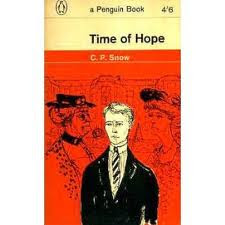
You may recall my depressing conclusion at the end of Trollope’s THE PRIME MINISTER that I might in fact have actually completed the western cannon, and that what lay before me was either minor works by great writers or simply minor writers.
In this spirit I bought TIME OF HOPE by the not very eminent CP Snow. Hurray for minor authors! It is brilliant. And the best part is, that it is only the first in an ELEVEN BOOK SERIES. What is even better than one book? Ten books to follow! The Western cannon is still firing!
TIME OF HOPE tells the story of the early life of one Lewis Eliot. His father goes bankrupt at about the time of the First World War, when Lewis is a small child, and the book follows his attempts to make a life for himself.
It’s an interesting picture of a truly class bound Britain, because even though Lewis is exceptionally bright, and gets excellent results at school, the fact that he has no “connections” means that university is effectively barred to him. He takes an enormous risk, investing his small inheritance in sitting examinations for the bar, and manages eventually to become a moderately successful barrister – a huge achievement for someone of his background.
Showing that human nature does not change much, Lewis is also struggling with trying to disentangle himself from a girl who is clearly bad news. She says classic mess-with-you things like: “I don’t love you, but I trust you,” and “You’re the only one I feel safe with, but I’m not ready for a relationship,” and poor Lewis laps it up. Eventually, like an idiot, he marries her.
I don’t know anything about CP Snow, but I am quite sure that this book is heavily autobiographical. What is most touching about it is the sense throughout that everything he writes is something he has painfully lived. It is clearly the book of an older man trying to understand his past as honestly as he can, and that project – of being honest about what you have done – is always an honourable and a difficult one, whether you put it into book format or not.
Thus then, on his obsession with his horrible wife:
Some secret caution born of a kind of vanity made me bar my heart to any who forced their way within. I had only been able to lose caution and vanity, bar and heart, the whole of everything I was, in the torment of loving someone like Sheila, who invaded me not at all and made me crave for a spark of feeling, who was so wrapped up in herself that only the violence and suffering of such a love as mine brought the slightest glow.
Much though of the novel is very funny. Here he is on his aunt, a battleaxe of a woman:
She believed in speaking the truth, particularly when it was unpleasant.
And on the morality of his era:
It had often seemed to me strange that men should be so brazen with their moral indignation. Were they so utterly cut off from their own experience that they could utter these loud, resounding, moral brays and not be forced to look within? What were their own lives like, that they could denounce so enthusiastically? If baboons learned to talk, the first words they spoke would be stiff with moral indignation
One down, ten to go!

Perhaps not that autobiographical, but a bright book, indeed! I read it in Lithuanian translation ages ago, probably in 1974, and I still have a vivid memory of some moments in the plot.
Algimantas at http://litvinas.blogspot.com/
That's amazing, that you still remeber it after so long!
I just checked it out at the library. All 5 copies owned by the library were in storage and I had to wait a few days while some clerk searched the sub-basement storage unit where CP Snow books reside at ACPL. I suppose that is what happens to minor writers.
Oh wow! Shame how sad – for someone who worked so hard!